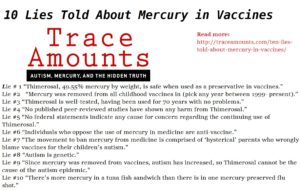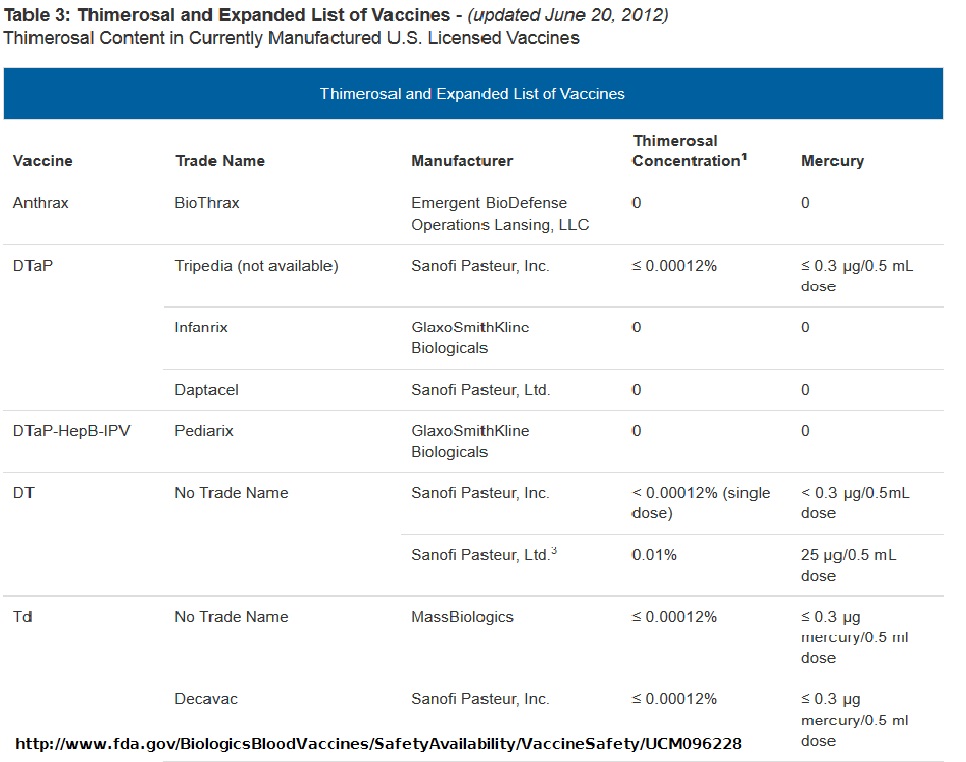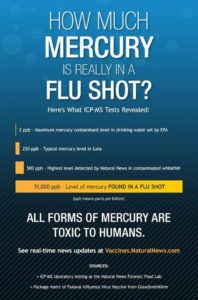To jump to other Ingredients sections:
Ten Lies Told About Mercury in Vaccines: “Trace Amounts: the Movie”
 Evaluation of Studies Showing Inorganic Mercury in the Brain Half-Life: Up to 22 years.
Evaluation of Studies Showing Inorganic Mercury in the Brain Half-Life: Up to 22 years.
http://www.sciencedirect.com/science/article/pii/S0041008X13005644
Mercury – Which Vaccines Contain Mercury (Thimerisol)
FDA Website (scroll down to the Tables to view a seen below)
How Mercury Causes Neorodegeneration in the Brain – Video (5 minutes)
FDA List of Vaccines that still contain Thimerisol.

Ethylmercury versus Methylmercury
http://www.ncbi.nlm.nih.gov/m/pubmed/23401210/
Comparison of Ethylmercury and Methylmercury
http://www.ncbi.nlm.nih.gov/m/pubmed/4091651/
Ethylmercury Study
“In genetically susceptible individuals, this [mercury] could be one step in the series of events leading to autoimmunity [disorders]. ”
http://www.ncbi.nlm.nih.gov/pubmed/25701957
Thimerisol and Animal Brains
“Brain concentrations of total mercury were approximately 3–4 times lower in the thimerosal group than in the methylmercury group, and total mercury cleared more rapidly in the thimerosal group (with a half-life of 24.2 days versus 59.5 days). However, the proportion of inorganic mercury in the brain was much higher in the thimerosal group (21–86% of total mercury) compared to the methylmercury group (6–10%).”
http://www.ncbi.nlm.nih.gov/pmc/articles/PMC1280369/
Exposure to Mercury and Aluminum in Early Life
“Concerns about the safety of Thimerosal (in relation to the developing CNS) are undervalued relative to its use as a preservative in pediatric vaccines on account of costs.”
“findings have showed a solid link with neurotoxic effects in humans; however, the potential synergic effect of both toxic agents has not been properly studied.”
http://www.ncbi.nlm.nih.gov/pmc/articles/PMC4344667/
Analysis of CDC’s own database confirms thimerisol link to neurodevelopmental disorders
http://www.najms.org/temp/NorthAmJMedSci610519-4295431_115554.pdf
Biological Evidence of Significant Vaccine Related Side Effects Resultin g in Induced Neurodevelopmental Disorders. (Includes studies, news articles and sources.)
g in Induced Neurodevelopmental Disorders. (Includes studies, news articles and sources.)
Dr. Bradstreet Powerpoint
Thimerosal and Developmental Delays
http://www.ncbi.nlm.nih.gov/pubmed/25489565
Making sense of epidemiological studies in young children exposed to Thimerisol
“a) there is ambiguity in some studies reporting neurodevelopment outcomes that seem to depend on confounding variables; b) the risk of neurotoxicity due to low doses of thimerosal is plausible at least for susceptible infants; c) there is a need to address these issues in less developed countries still using TCV… in pregnant mothers, newborns, and young children.”
http://www.ncbi.nlm.nih.gov/m/pubmed/20638374/?i=7&from=%2F21350943%2Frelated
Administration of thimerosal to infant rats increases overflow of glutamate and aspartate in the prefrontal cortex: protective role of dehydroepiandrosterone sulfate. Neurochem Res. 2012
http://www.ncbi.nlm.nih.gov/pubmed/22015977
Comparison of Blood and Brain Mercury Levels in Infant Monkeys Exposed to Methylmercury or Vaccines Containing Thimerosal. Environmental Health Perspectives, August 2005
http://www.ncbi.nlm.nih.gov/pubmed/16079072
Integrating experimental (in vitro and in vivo) neurotoxicity studies of low-dose thimerosal relevant to vaccines. Neurochem Res. 2011
http://www.ncbi.nlm.nih.gov/pubmed/21350943
Lasting neuropathological changes in rat brain after intermittent neonatal administration of thimerosal. Folia Neuropathology, 2010
http://www.ncbi.nlm.nih.gov/pubmed/21225508
Maternal thimerosal exposure results in aberrant cerebellar oxidative stress, thyroid hormone metabolism, and motor behavior in rat pups; sex and strain dependent effects. Cerebellum. 2012
http://www.ncbi.nlm.nih.gov/pubmed/22015705
Neonatal administration of thimerosal causes persistent changes in mu opioid receptors in the rat brain. Neurochem Res. 2010
http://www.ncbi.nlm.nih.gov/pubmed/20803069
Neurodevelopmental disorders following thimerosal containing childhood immunizations: a followup analysis International Journal of Toxicology, 2004
http://www.ncbi.nlm.nih.gov/pubmed/15764492
Persistent behavioral impairments and alterations of brain dopamine system after early postnatal administration of thimerosal in rats. Behav Brain Res, 2011
http://www.ncbi.nlm.nih.gov/pubmed/21549155
Thimerosal induces neuronal cell apoptosis by causing cytochrome c and apoptosisinducing factor release from mitochondria. International Journal of Molecular Medicine, 2006
http://www.ncbi.nlm.nih.gov/pubmed/16273274
Thimerosal Exposure and the Role of Sulfation Chemistry and Thiol Availability in Autism Int. J. Environ. Res. Public Health 2013
www.mdpi.com/journal/ijerph
